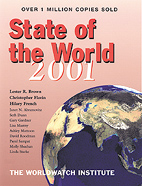Worldwatch Institute released its annual report, State of the World 2001. It notes that signs of accelerated ecological decline and loss of political momentum on environmental issues are emerging simultaneously. 
Scientific evidence indicates that many global ecosystems are reaching dangerous thresholds. The Arctic ice cap is thinner by 42 percent and 27 percent of the world’s coral reefs have been lost, suggesting that some of the planet’s key ecological systems are in decline. Natural disasters associated with environmental degradation cost $608 billion over the last decade – as much as in the previous four decades combined.
The encouraging signs of progress include the worldwide treaty signed in December to severely restrict 12 persistent organic pollutants. Organic farming now has a worldwide annual market of $22 billion. But fossil fuel use must slow dramatically to avoid acute water shortages, declining food production, and the proliferation of deadly diseases such as malaria.
State of the World 2001 calls for stronger enforcement of international treaties, and for increased North-South cooperation. A collective commitment by the E9 (China, India, U.S., Indonesia, Brazil, Russia, Japan, South Africa, EU) to renewable energy systems, for example, could have a dramatic impact on energy markets and reduce the rate of global warming.
160 delegates from 100 governments met in mid-February to consider the implications of the latest version of the UN Intergovernmental Panel on Climate Change (IPCC) report. They unanimously accepted the 1,000 page report, the work of 426 authors around the world over three years. According to the report, climate change impacts will be felt disproportionately by the poor because less developed economies depend on, for example, agriculture, which is more vulnerable to climate change. And the ability for such economies to adapt is low.
Another major report, this time by insurance companies that participate in the United Nations Environment Programme’s financial services initiative, concludes that climate change impacts could cost the world $300 billion per year. Losses will come from more frequent tropical cyclones, loss of land as a result of rising sea levels, and damage to fishing stocks, agriculture, and water supplies.
“Our Planet” magazine at [sorry this link is no longer available] will carry an article on the UNEP report by Munich Re, one of the world’s biggest re-insurance companies.
“Climate Change 2001: Impacts, Adaptation and Vulnerability”: [sorry this link is no longer available]
The State of the World 2001 report: http://www.worldwatch.org
Worldwatch Releases 2001 State of the World Report

Published on: February 28, 2001
(Visited 72 times, 8 visits today)